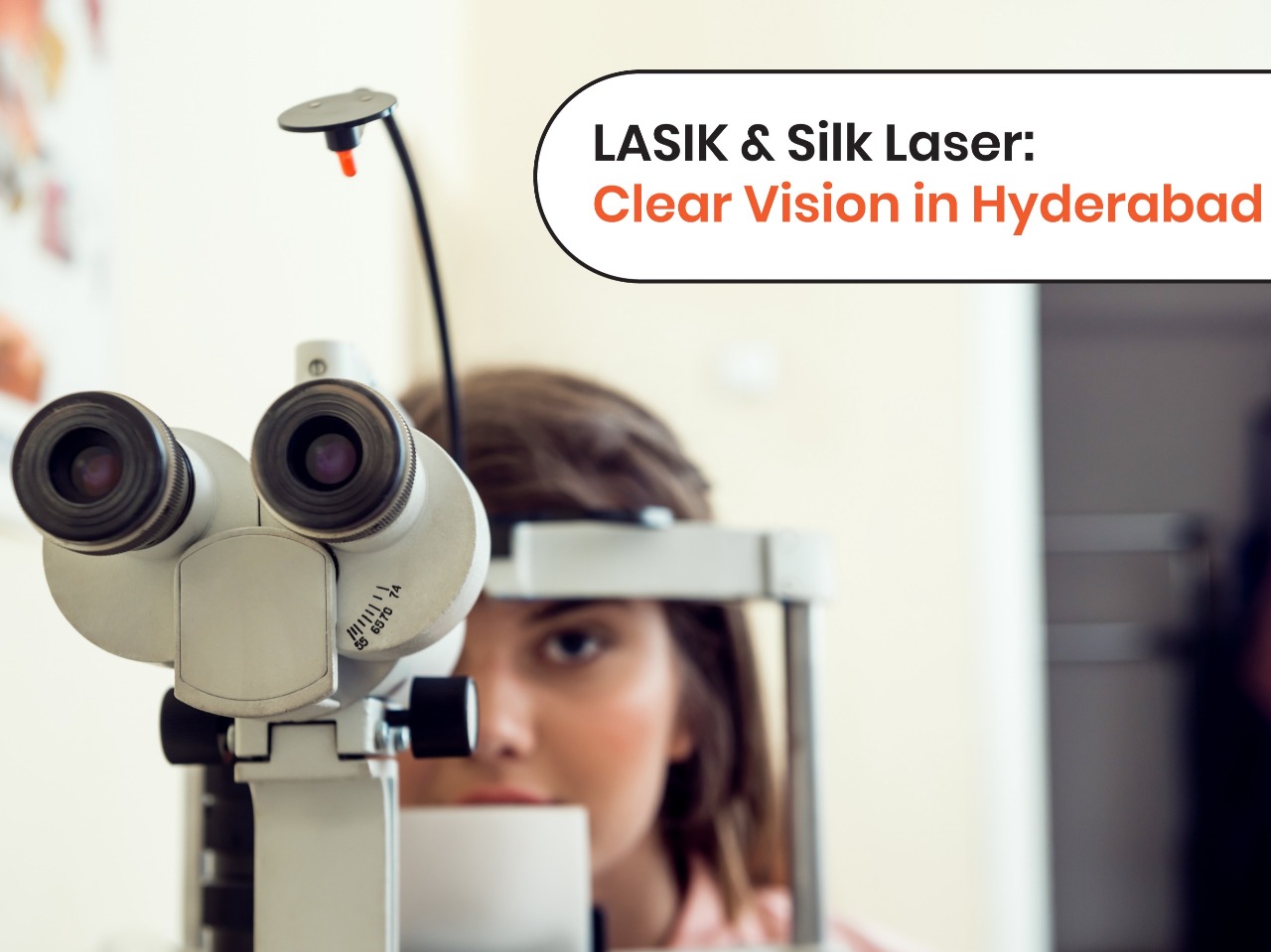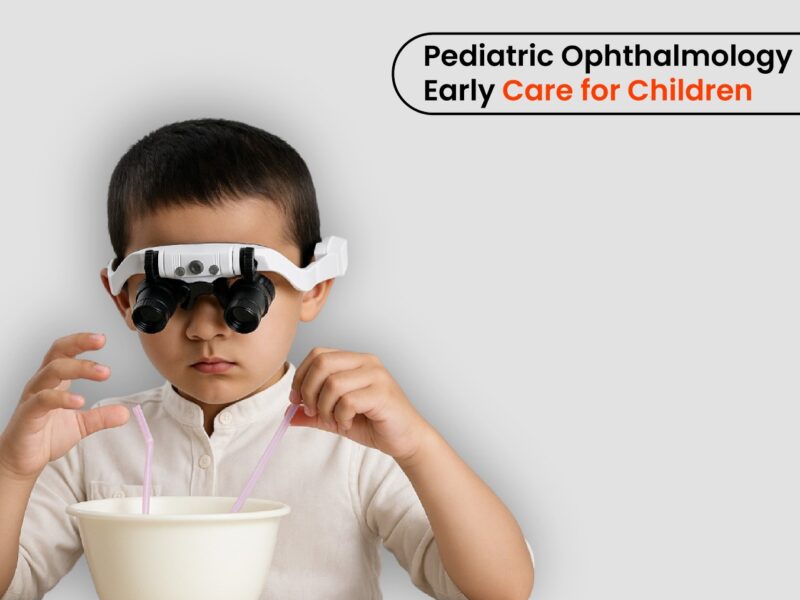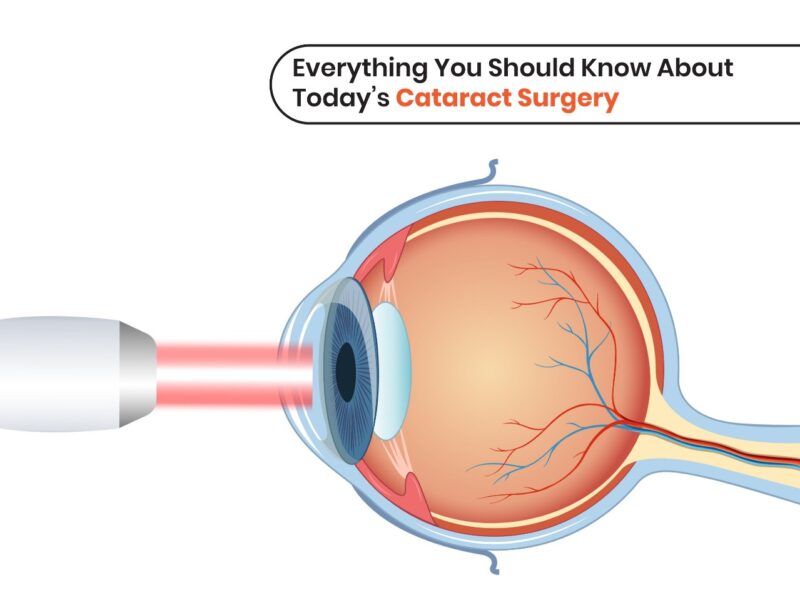Everything You Should Know About LASIK and Silk Laser Eye Surgery in Hyderabad
In today’s 21st century, rapid advancements are happening across the globe in every sector be it technology, education, or healthcare. Each platform is setting new benchmarks for future generations. The medical field is no exception, embracing these developments in both treatments and techniques. LASIK and SILK stand out as prime examples of revolutionary progress in medical science. Both advanced eye surgeries provide relief for those wanting to eliminate glasses or contact lenses. However, while they share a similar goal, their procedures and effectiveness differ. This can leave patients uncertain when choosing between LASIK and SILK. In this blog, we’ll compare the two to help you understand their unique features and benefits.
What is LASIK Eye Surgery?
LASIK, short for ‘Laser-Assisted in Situ Keratomileusis,’ is a popular vision correction surgery. It treats conditions like nearsightedness, farsightedness, and astigmatism. The procedure reshapes the cornea, ensuring light entering the eye focuses properly on the retina, resulting in clearer vision. At LASIK Treatment in KPHB, Hyderabad, the process is virtually painless. While patients remain awake throughout the surgery, anesthetic eye drops are used to numb the eyes and ensure comfort during the procedure.
Who is Suitable to Undergo the Treatment?
When considering LASIK eye surgery at LASIK Treatment in KPHB, Hyderabad, there’s no absolute answer that fits everyone. However, there are several general criteria that can help determine your eligibility for the procedure. Ultimately, it is your surgeon’s responsibility to evaluate your condition and decide whether LASIK is appropriate for you. Common factors that indicate suitability include:
You must be at least 18 years old.
Your eyeglass or contact lens prescription should be stable for at least 2 to 3 years.
Your vision should not have undergone significant changes within the past year.
You should not be pregnant.
There should be no history or current signs of active corneal disease.
You must not have any major medical or eye-related issues.
Important Considerations Before Undergoing LASIK Treatment in KPHB, Hyderabad
Before the Surgery :
If you currently wear contact lenses, it’s recommended to stop using them and switch to glasses full-time at least 3 to 4 weeks before your initial evaluation.
Inform your doctor about any past or present medical conditions.
On the day before your surgery, avoid using lotions, creams, makeup, or perfumes.
Your doctor might advise you to clean your eyelashes regularly for a few days prior to the procedure to eliminate any debris or residue.
After the Surgery :
You may feel mild discomfort following the treatment. Your eyes might itch, burn, or feel like there’s something in them.
Sensitivity to light, along with glare or halos around lights, is common but typically subsides within a few days.
Your vision may initially appear blurry or hazy.
Refrain from swimming for at least 1 to 2 months to reduce the risk of infection.
If you notice any unusual symptoms after the procedure, it’s crucial to contact your eye doctor immediately. Ignoring such signs may lead to serious complications, including potential vision loss if not addressed promptly.
What Makes SILK Eye Surgery Unique?
SILK Eye Surgery in KPHB, Hyderabad short for Smooth Incision Lenticule Keratomileusis is an advanced vision correction technique introduced by Johnson & Johnson. This state-of-the-art procedure employs an ultra-precise laser called ELITA to create a small, disc-shaped lens (lenticule) within the cornea. Once this lenticule is removed, the cornea is reshaped, effectively correcting refractive errors such as myopia (nearsightedness) and astigmatism. SILK is a minimally invasive treatment that does not require creating a corneal flap, resulting in quicker healing and greater comfort compared to conventional techniques. With its customized treatment approach, SILK eye surgery is an excellent option for patients who wish to reduce or completely eliminate their reliance on glasses or contact lenses.
SILK surgery distinguishes itself as a revolutionary bladeless eye correction method. Unlike traditional LASIK, it avoids the creation of a corneal flap altogether. This flap-free technique reduces discomfort, enhances procedural safety, and offers highly precise outcomes—especially for individuals dealing with myopia and astigmatism.
Advantages of SILK Eye Surgery in KPHB, Hyderabad
SILK provides a wide range of benefits when compared to traditional vision correction procedures. These advantages include:
1. Lower Risk Factors
Conventional laser eye surgeries typically require the use of a microkeratome blade to create a corneal flap, which can lead to complications such as incomplete or uneven flaps. SILK, on the other hand, completely eliminates the use of blades, significantly reducing the risk of such issues and offering a more seamless surgical process.
2. Superior Safety Standards
SILK employs cutting-edge laser technology that delivers unmatched precision throughout the surgery. This advanced system allows for highly personalized adjustments based on each patient’s eye structure, which helps reduce the likelihood of procedural errors and enhances overall safety.
3. Quicker Healing Time
Because SILK does not require the creation of a corneal flap, it causes less disturbance to the corneal surface. As a result, patients usually heal faster and can return to their everyday routines within just a few days after undergoing the procedure.
4. Fewer Dry Eye Symptoms
Unlike traditional laser surgeries, SILK preserves the delicate corneal nerves that are often affected in flap-based techniques. This nerve preservation plays a key role in reducing the risk of post-operative dry eye symptoms, resulting in improved comfort and a smoother recovery experience.
5. Greater Precision and Accuracy
The advanced mapping and execution capabilities of the SILK laser system ensure extremely precise results, which is especially advantageous for individuals with complex prescriptions or significant refractive errors. The outcome is sharper, clearer vision that is customized to each patient’s specific visual needs.
Cutting-Edge Technology Behind SILK Eye Surgery
The SILK procedure at Silk Eye Surgery in KPHB, Hyderabad, utilizes a highly sophisticated femtosecond laser system that emphasizes both precision and patient safety. This advanced device operates at incredibly high speeds, emitting laser pulses measured in femtoseconds equivalent to one quadrillionth of a second. Its superior imaging features allow for detailed, high-resolution mapping of the cornea, giving surgeons the ability to perform highly customized corrections based on each eye’s anatomy. This laser system functions on the inner corneal layers without the need to create a flap, making the procedure minimally invasive and significantly reducing discomfort after surgery.
Potential Risks of SILK Surgery
Despite its many benefits, SILK surgery does carry some risks, though they are generally rare and temporary :
Mild Discomfort: Some patients may notice slight discomfort or dryness following the surgery; however, these symptoms usually subside within a few days.
Sensitivity to Light : A temporary sensitivity to light may occur immediately after the procedure but typically resolves within the first week.
Undercorrection or Overcorrection: In rare cases, the initial results may not fully meet expectations, and a follow-up enhancement procedure might be needed.
Risk of Infection : As with any surgical procedure, there’s a minimal risk of infection, which can be minimized through proper post-operative care and medication compliance.
It is crucial to speak with your surgeon about any concerns prior to undergoing surgery. Doing so helps ensure you are well-informed, understand the potential risks, and are prepared to follow all necessary precautions.
Precautions After SILK Eye Surgery
Following SILK eye surgery, it’s important to take certain precautions to support healing and avoid complications. Recommended steps include:
Refrain from rubbing your eyes and use protective eye shields while sleeping to prevent accidental contact.
Apply the prescribed eye drops as directed to reduce the risk of infection.
Avoid engaging in strenuous physical activities or swimming for a few days after the procedure.
Wear sunglasses outdoors to shield your eyes from bright light, wind, and dust particles.
Steer clear of makeup and other cosmetic products around the eye area.
Continue using all prescribed medications and carefully follow the post-operative care instructions given by your surgeon.
Who Stands to Benefit Most from SILK Eye Surgery?
Silk Eye Surgery in KPHB, Hyderabad, is a highly suitable option for individuals in search of a minimally invasive, bladeless laser vision correction procedure. This innovative technique is especially beneficial for people who:
Have mild to moderate levels of myopia or astigmatism.
Maintain active lifestyles and are looking for a faster recovery period.
Are worried about experiencing dry eye symptoms or complications related to corneal flaps, common with traditional LASIK.
Possess thin corneas, which may disqualify them from undergoing other types of laser eye surgery.
A comprehensive consultation with a skilled ophthalmologist will help assess your eye health, confirm your eligibility, and ensure the procedure is customized to meet your individual vision correction needs.
A Clearer Tomorrow with Silk Eye Surgery in KPHB, Hyderabad
Bladeless laser vision correction particularly through the SILK procedure has redefined standards in the field of refractive eye surgery. Known for its exceptional safety, precision, and patient comfort, SILK offers individuals the opportunity to enjoy clear vision without the dependency on glasses or contact lenses. This advanced technique is especially well-suited for athletes and individuals with active lifestyles who are seeking a reliable and minimally invasive vision correction option.
Conclusion :
When comparing LASIK and SILK eye surgeries, it’s important to understand that no single procedure fits every patient. Each method comes with its own advantages and limitations, and the ideal choice depends on personal vision needs, lifestyle preferences, and medical suitability. Consulting with an experienced and knowledgeable eye surgeon is essential to achieving the best results in vision correction.
Medivision Eye Hospital in Hyderabad is widely recognized as one of the leading eye care centers in India for both LASIK and SILK procedures. Schedule a consultation to receive personalized care from expert eye specialists committed to delivering excellence with compassion and precision



